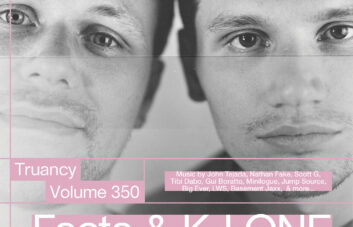Seven Plays is a feature where our contributors, extended family and friends keep a personal music diary for seven days, before handing the format over to another author. The aim is to keep sharing great music, this time with an individual touch that celebrates the intimacy and emotionality of our relationships with music as well as sonic excitement and technical prowess.
This instalment comes from Daoud Al-Janabi, who is based in Leeds, UK and works at online music retail store Norman Records. Daoud plays the trombone, is a part of doom metal band Lo Egin and co-hosts a show on Sable Radio. His selections below reflect his craft as an instrumentalist and his enthusiasm for finding joy and wonder in sound, featuring breathtaking drone, instructive jazz and a very welcome cut from Steely Dan.
Tuesday: Hiroshi Suzuki – Walk Tall
The tradition of trombonists in jazz music is to always be the bridesmaid, never the bride; I think I can name more tuba-playing bandleaders than trombonists. So I’m always on the lookout for them, and the recently announced reissue of Hiroshi Suzuki’s 1975 album Cat has gifted me another musician I can crib off.
The whole album is a joy, but “Walk Tall” is going to be the piece that remains in my heart. Its exuberant head is catchy and fun, featuring harmonies that implode with colour and light. I can’t explain why this one hits as hard as it does, it can’t just be our shared instrument. The improvisations are also a delight – the first of which sees Suzuki initially eschewing the melodic, and instead peppering his band’s mean groove with an occasional light blast from his instrument. He eventually builds to something more conventional, always keeping that sense of power before he and the band take us back to the magical head.
Wednesday: Tony Conrad – The Side of Man and Womankind
I love Tony Conrad. Ask anyone who knows me, they’ll tell you, “that guy loves Tony Conrad!” I recently read Harry Sword’s Monolithic Undertow, in which he charts how the drone came to be so central in leftfield Western music and it gave me a very welcome push to put something by Conrad on.
This comes from Outside The Dream Syndicate, the album Conrad made with krautrock pranksters Faust in 1973. As Conrad made them reign themselves in, Faust are pretty much restrained to one bass note and a literally metronomic drum beat. This rigour, this discipline provides Conrad the solid bedrock he needs to commence his dark arts. He plays like few others, almost always holding two discordant notes, almost never stopping. By disguising the change in direction of his arm behind subtle tonal shifts he makes a mockery of the inherent limit to the violin. When Conrad plays, the bow sounds like an infinite plain.
Thursday: Steely Dan – Glamour Profession
Even if I didn’t like Steely Dan, I think I’d have appreciation for them for the ways they keep cropping up in my life. I was introduced to them by a friend passing me a USB stick of the rock canon which he’d snuck Aja on to. Later we’d hear Dean Blunt drop “Black Cow” from that album in the basement of a north London wine bar. Another friend’s dad once gave me two records by them (and one by Genesis) for no reason. Every few months someone in a Discord server I’m in discovers them and becomes hooked. This isn’t normal, these things don’t happen with other bands.
One of the records given to me by that dad was 1980’s Gaucho, which has become a staple when me and my partner sit on our living room floor and play board games. Theirs is music knotty enough to kick off obsession but smooth and effortless enough that you can use it as a backdrop for some wholesome family fun.
Friday: Doom Roost – Love, Warp
There are few greater pleasures than listening to music by your friends. So, full disclosure: Doom Roost is a friend, a bandmate and an ex-colleague, Your Scene was released on his label which he runs with another friend, and the artwork was done by a third. I’m so proud of all of them.
This tape has been such a balm to me. To create it, Doom Roost returned to music he made as a teenager and algorithmically stretched them out into these haunting echoes. The thought of returning to anything I created as a teenager fills me with dread, let alone releasing them on my own label. But this abstraction by algorithm smooths the originals over, audibly casting them into the fog of nostalgia. They have become loaded with yearning – not for times gone by, but for the possibilities contained in our memories of them.
Saturday: Young Fathers – Get Up
Young Fathers are my favourite boyband. They’re impeccably dressed and are all at least willing to dance. Most importantly they are so much more than the sum of their parts: each member’s personality compliments the others’, making the whole completely magnetic.
“Get Up” comes from their debut album and very much does what it says on the tin. With just a simple, clapped rhythm and this weirdly gooey saw bass line, they provide more than enough heat for us to “get up and have a party”, but it’s the interplay of their vocals that really causes the track to catch fire. They respond to each other’s calls, or they’re backing vocalists when they need to be. They take turns as frontman, but are always happy to slip into a background role for the music’s sake, like any good boyband member. I wonder what Simon Cowell makes of them.
Sunday: Myra Melford – Park Mechanics
My favourite music listening ritual comes on Sunday morning. I wake up and go on a run down the Leeds-Liverpool canal while listening to Corey Mwamba’s wonderful BBC Radio 3 show, Freeness. Mwamba’s purview is on improvised musics, all kinds. The same show will see him playing jazz and metal and noise and more, tying it all together with his thoughtful and generous words.
Most recently I was struck by this Myra Melford piece. On “Park Mechanics” she slips almost without my noticing between its beautiful head, whose melody cascades like water through her use of the sustain pedal, and improvisation that can be jarringly sparse or overwhelmingly frenetic. It’s the privilege of the pianist that they can be their own orchestra, and Melford is expert at indulging the variety of personalities that implies. Thank you Corey.
Monday: Hank Mobley – The Best Things In Life Are Free
I have never been more grateful to play a musical instrument than in the last year. My trombone has offered a means for me to engage my creativity and explore far beyond the boundaries of this necessarily locked-down moment. For the past few years I have been taking lessons in improvisation, and recently this Hank Mobley tune has been my main practice space as I try to get to grips with tritone substitution, something my music teacher will be concerned to read I still don’t have that good a grasp of.
I can’t speak too deeply about Mobley’s version, I’ve only listened to it a few times, but for having played along with a computer-generated backing track for hours and hours, I feel a powerful sense of ownership of the song – that is, my version of it. Each time I play it I find small licks I can reincorporate in later playthroughs, slowly but surely moulding the space between the chords into something that sounds like me.
Read our previous instalments of Seven Plays here. Photo: Daoud Al-Janabi by Xavier Pillai.



